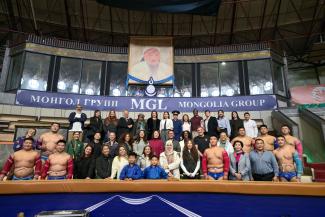Live Blog: World Championships Day 6 - GR 55kg, 72kg, 77kg, 82kg
Thursday, October 7, 2021 - 08:25 By Vinay Siwach

OSLO, Norway (October 7) -- Greco-Roman action begins in Oslo on day six of the World Championships with two-time Olympic champion Roman VLASOV (RWF) aiming for a Worlds gold. A host of other Greco-Roman will be on the mat at the Jordan Amfi arena. (Day 5 Wrap - Gray, Fujinami Dominate to Gold)
MATCH ORDER | WATCH LIVE | ALL PHOTOS
1400: Quarterfinal results of the GR 82kg weight class
Burhan AKBUDAK (TUR) df Benjamin PROVISOR (USA), 10-0
Adlan AKIEV (RWF) df Hannes WAGNER (GER), via fall
Rafiq HUSEYNOV (AZE) df Alex KESSIDIS (SWE), 7-6
Pejman POSHTAM (IRI) df Radzik KULIYEU (BLR), 3-1
1350: Quarterfinal results of the GR 72kg weight class
Mohammad MOKHTARI (IRI) df Ulvu GANIZADE (AZE), 10-0
Malkhas AMOYAN (ARM) df Kristupas SLEIVA (LTU), 5-0
Sergei KUTUZOV (RWF) df Gevorg SAHAKYAN (POL), 7-3
Cengiz ARSLAN (TUR) df Mikko PELTOKANGAS (FIN), 9-0
1335: Quarterfinal results of the GR 77kg weight class
Roman VLASOV (RWF) df Mohammadali GERAEI (IRI), 10-1
Tamas LEVAI (HUN) df Viktor NEMES (SRB), 1-1
Sanan SULEYMANOV (AZE) df Roland SCHWARZ (GER), 10-2
Tsimur BERDYIEU (BLR) df Kodai SAKURABA (JPN), 11-3
1325: Quarterfinal results of the GR 55kg weight class
Emin SEFERSHAEV (RWF) df Khorlan ZHAKANSHA (KAZ), 5-1
Ken MATSUI (JPN) df Ekrem OZTURK (TUR), 5-5
Norayr HAKHOYAN (ARM) df Max NOWRY (USA), 9-0
Eldaniz AZIZLI (AZE) df Sardarbek KONUSHBAEV (KGZ), 10-1
1300: What a win! Rafig HUSEYNOV (AZE) trailed 0-1 at the break but goes for a five-point throw then a chest wrap to four for an 11-1 win over Kalidin ASYKEEV (KGZ)
1245: Another top bout at 77kg. Tamas LEVAI (HUN) and former world champ Viktor NEMES (SRB) will be wrestling for a spot in the quarterfinal
1230: Emin SEFERSHAEV (RWF) has set up a quarterfinal against Khorlan ZHAKANSHA (KAZ) at 55kg. At 77kg, a huge bout coming up as Roman VLASOV (RWF) wrestles Mohammadali Abdolhamid GERAEI (IRI).
1205: Roland SCHWARZ (GER) is moving on to the next round after upsetting Alexandrin GUTU (MDA) 7-1. Good win for Schwarz
1150: Tokyo Olympics bronze medalist Rafig HUSEYNOV (AZE) is once again back to 82kg. He won a silver in Nursultan and now he has begin with a 9-0 win over Ranet KALJOLA (EST)
1130: Alex BJURBERG KESSIDIS (SWE) wins a 9-3 battle against Maxat YEREZHEPOV (KAZ) to the delight of the crowd.
1110: Two-time Olympic champion Roman VLASOV (RWF) in on Mat B against Tamerlan SHADUKAYEV (KAZ). He gets going with a passivity call. 1-0 up. A gut and a huge four-point throw against once again a gut and he will finish it 9-0 in two minutes and 10 seconds
1100: Tamas LEVAI (HUN) hangs on for a 5-5 win over Antonio KAMENJASEVIC (CRO) in a tough match. Meanwhile, World Championships bronze medalist Mohammadali GERAEI (IRI) wins 6-1 in his first bout.
1050: Junior world championships bronze medalist Alexandrin GUTU (MDA) gets going with a 7-2 win over Emmanuel BENITEZ CASTRO (MEX) in the opening round at 77kg
1030: We are underway with the Greco-Roman style here at Jordan Amfi arena. Big crowd in already for the day


Share your thoughts.
Comments